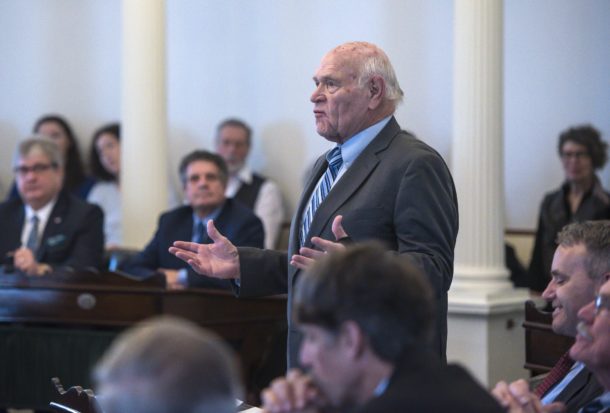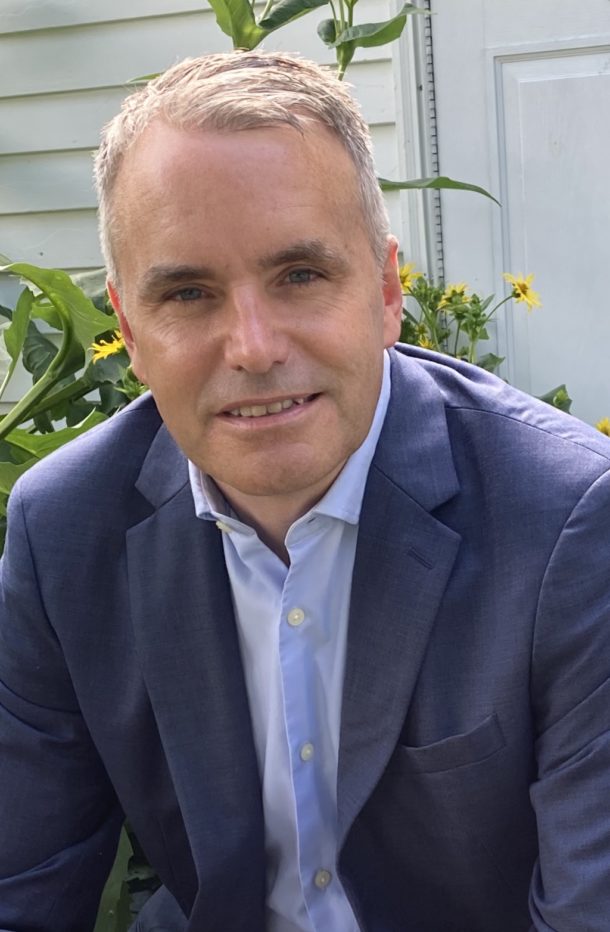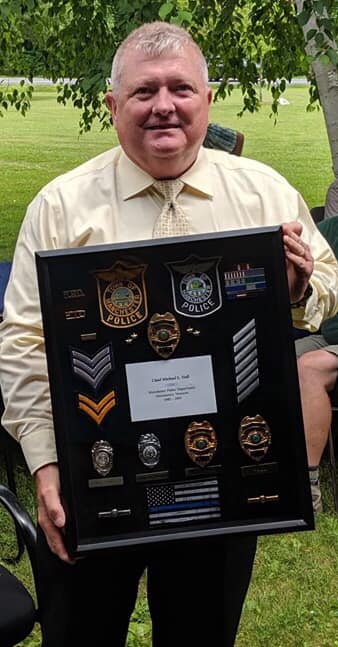Three Bennington County conservatives have taken on the mighty task of challenging two incumbent Democrats for two state Senate seats. In photos above, Brian Campion and Dick Sears, at top, are the incumbent Democratic state senators; challengers, from left, are Meg Hansen, Kevin Hoyt and Mike Hall.
Hansen, a Republican, was recently edged by Scott Milne in the Republican primary for the lieutenant governor nomination.
Hall, a Republican, cites his experience as Manchester’s former police chief.
Hoyt, an independent, is a conservative and gun rights activist who is also running for governor. Hoyt ran as a Republican for a House seat in Bennington’s 2-1 district in 2018, but lost to Rep. Chris Bates, a Democrat.
Their competition: Campion, now in his sixth year as a senator, and Sears, who began his tenure in the Statehouse in 1993. In 2018, FiscalNote named Sears one of the most effective state lawmakers in the nation, with a 60% pass rate on bills he’s sponsored.
Hansen collected name recognition through her campaign for lieutenant governor, and thinks she can beat one of the incumbents. Her platform calls for change, for in a transfer of power to a new generation.
“We won every town in Bennington County,” Hansen said of her race for lieutenant governor. (Hansen lost only in Woodford, where a total of 19 votes were cast.) “That really was why I was asked to run in this race. I look at that as a mandate from the people.”
Only six of Vermont’s 30 state senators are Republican, and the GOP candidates say they want to broaden representation.
VTDigger is underwritten by:
The Democratic incumbents, however, cite their effectiveness in representing Bennington County — which many believe is often overlooked in the Statehouse — as a team.
“I feel it’s tremendously important that whoever represents Bennington County do so as a team,” Sears said, “because if they can’t, we just get outnumbered by other northern counties like Washington County, and even Rutland County, with much larger populations.”
In August’s primary votes, more Bennington County residents voted Democratic than Republican, but the incumbents say they aren’t taking anything for granted.
Incumbents
Dick Sears (D)
After 27 years in the state Senate, Sears believes his experience and track record of productivity shows he can help solve the pressing issues facing the state — especially, navigating the economic fallout from the pandemic.
“Whoever is elected governor, and to the Legislature, is going to have to deal with that challenge,” Sears said.

He says the largest issues facing Bennington County are economic development and social equity, and he spoke about reforming the Bennington Police Department.
Sears serves on multiple boards and committees and chairs the Senate Judiciary Committee. He plans to build on S.119, a bill that became law this month; it restricts police officers’ use of deadly force.
Sears supported the Global Warming Solutions Act, which became law when the Legislature overrode Gov. Phil Scott’s veto, and said addressing climate change is an urgent matter.
“We have to change,” he said. “I just think we can see the way the climate’s changing. The storms are more severe. I felt like, if I voted ‘no’ on this, what would it be saying to the kids who have approached me over the years? They’re concerned about what happens to them and their children.”
The highlight of Sears’ career in the Senate? Helping to pass Vermont’s law allowing civil unions.
“When the marriage equality bill actually passed, that was somewhat anticlimactic for me, because there was so much anger,” he said, “and so much hate by opponents of that bill, and yet people stood strong.”
Brian Campion (D)
VTDigger is underwritten by:
Sears’ running mate, Campion said his top priorities are the economy and the health of Vermonters during the pandemic. Related to that, he’s concerned about the nomination of a Supreme Court justice who could help repeal the Affordable Care Act.
“Tens of thousands of Vermonters could be without health care,” he said. “That would take some real leadership, and really working with people to make certain that health care is not interrupted.”
Campion plans to continue advocating for small businesses, which he said are “without a doubt the backbone of this Senate district.”

Campion is on the Senate Ethics and Finance committees, is vice chair of the Senate Committee on Natural Resources and Energy and of the Legislative Information Technology Committee, and is co-chair of the Senate Workgroup on Transition Challenges.
Campion supported the Global Warming Solutions Act, and sees it as an “economic development bill” as much as an environmental policy bill, and hopes that requiring clean energy infrastructure will create jobs.
“I think we all know that Vermont is not going to protect us from what’s coming with regard to climate change,” he said. “But we all have to do our part.”
He’s committed, he said, to passing legislation that protects people of color in Vermont, and that promotes a culture that makes them feel welcome. He said legislators are responsible for facilitating conversations about racism on a local level.
“This is such a wonderful state,” he said. “We want people to move here and become Vermonters right away. Diversity is a strength, so we need to keep working on this.”
This week’s Bennington County Senate debate hosted by GNAT-TV between was called off shortly after it started when a storm cut power for three of the participants. During that debate, moderator Andrew McKeever asked Mike Hall, the former Manchester police chief, about
S.119, the new law that regulates use of force by police. Hall responded that legislators need to “stay out of the weeds when it comes to law enforcement.”
Campion was off-air when the comment was made. Had he been able to respond, Campion said, he would have replied, “It’s our job. It’s absolutely our job to make certain that the citizens of our district feel safe. That makes working with law enforcement and working with community members to have conversations. I realize these are hard conversations, but that bill, which is now law, is a very important bill.”
Challengers
Meg Hansen (R)
With a degree in liberal studies from Harvard, the British equivalent of an M.D., and a background that includes extensive world travel, Meg Hansen would bring a new perspective to Vermont’s Republican Party, but holds fast to conservative values. She became well-known during her campaign for lieutenant governor, and though she lost to Scott Milne in the primary, she gained popularity in southern Vermont.
Hansen was born in India, where she said her family’s freedoms were constricted. Her platform is based on prosperity and the American Dream.

She hosts a show called “Dialogues with Meg Hansen” on YCN, and said she has talked to Vermonters who face financial obstacles while attempting to start businesses or to grow in their personal lives. Like the others vying for a Senate seat, she said the Legislature does not always deal with southern Vermont in a way that benefits constituents.
“We have our own challenges, whether it’s the urban landscape, or our particular working rural economy,” she said. “Representing that in a way that is more direct, more robust, is something that I think all of us here would really benefit from.”
While other lawmakers argue that the immense challenges of 2020 require political experience, Hansen said fresh thinking is required.
“2020 is the year for renewal,” she said. “We’re all feeling it. We know that we really can’t go back to business as usual, politics as usual.”
While running for lieutenant governor, Hansen explained her policy positions in a video for VTDigger. Though she said “mild climate change has been demonstrated,” she would “draw a line between mild climate change and climate alarmism that feeds into catastrophic predictions.” She thinks the Global Warming Solutions Act, for example, is fed by climate alarmism.
As for police reform and social justice, Hansen said, as a woman of color with an immigrant background, she finds herself “between a rock and a hard place” because she doesn’t believe in systemic racism. Individual racists exist and should be held accountable, she said, but she doesn’t think they’re part of a larger system.
“I don’t agree with the fact that the fundamental institutions that have created America, the founding documents, the founding fathers and their ideals, that they are rooted in white supremacy, and that somehow, systemically, there is a bias or prejudice against people who are non-white,” she said.
She said people on the far left call her a race traitor for her rejection of the concept, while some on the far right have told her to “go back to India.”
Hansen said she’s running to advance opportunities for middle-class families in the state, by promoting “economic freedom, health care freedom and education freedom.”
“Deregulation is number one, I would say,” she said.
Mike Hall (R)
Hall, a Sunderland resident, retired in 2019 after 36 years as the Manchester police chief. Hall thinks Vermont’s liberal state-level policies have sent the state in the wrong direction, and he wants to loosen regulations and lower taxes.

Hall said one thing makes him uniquely qualified to run for office: He was born and raised in Vermont.
“I actually grew up and was raised in the Manchester area,” he said during the beginning of GNAT-TV’s debate on Wednesday night. “I’ve seen the changes that have taken place in the state of Vermont that have turned the state around in a direction that is not in the best interest of Vermonters.”
He believes Act 250, which regulates land use and development, needs to be scrapped entirely.
“Act 250 was designed to restrict, stifle and slow down development, and it’s certainly done that,” he said. “If you look at prosperity in Vermont, where we’ve gone and where we ended up, I’ve said it before and I’ll say it again. Act 250 was the kiss of death in the state of Vermont. It’s done nothing but destroy this state over the last 50 years.”
Hall opposes police reform, and believes S.119, the new law that restricts use of deadly force by Vermont police, was designed by people who know “absolutely nothin’.” He said it’s easy to “Monday morning quarterback” police officers, who have to make decisions in seconds, and legislators should “stay out of the weeds” with regulating law enforcement.
“It’s very unrealistic to think that officers are going to be able to meet all of the benchmarks that they want,” he said.
Although he acknowledged racism exists in Vermont, he doesn’t think Vermont is a racist place, and does not believe lawmakers need to address the issue.
Hall opposed the Global Warming Solutions Act, and cited concerns about appointing, rather than electing, a climate council that will set some of the regulations.
His top priority would be reducing the state government’s debt.
“It’s certainly not the time to be entertaining anything that’s going to be more of a cost to Vermont residents,” he said.
Kevin Hoyt (i)
Hoyt said his values don’t align with major parties largely because he believes in a minimalist form of government.
“I want to defund the government. The government is the problem here,” he said, noting that he’s also running for governor. “Whether it’s senator or governor, I don’t want to govern anybody. You guys are Vermonters, and I trust ya, and I think you could probably do a better job of spending than our government has.”
Hoyt disagrees with labeling Covid-19 as a “pandemic.” He thinks mask mandates are unconstitutional and said he doesn’t trust the Covid mortality rates reported by government and the media.
If elected, he would work to decriminalize opioids and open rehabilitation centers, better than the ones that exist now, for people struggling with addiction.

He called the Global Warming Solutions Act “one of the most irresponsible pieces of legislation I’ve ever seen in my life,” though he said his experience as an outdoor educator proves he cares about environmental causes.
“I would never let anything happen to our natural resources, but I don’t see how taxing Vermonters is going to change the weather or the planet,” he said.
Hoyt is an avid gun rights activist. “The Second Amendment — ‘shall not be infringed’ is crystal clear to me,” he said. “I think those are our rights that are being trampled. And personally, that’s why I got involved.”
While some legislators hope to bring new people to Vermont to boost the economy, Hoyt said he opposes incentivizing non-Vermonters to move to the state.
“You mean like the 35 immigrants at Champlain Orchard, just brought into the state, and 27 of them had Covid?” he said, referring to workers who recently arrived and became symptomatic near the end of their 14-day quarantine. “Or are you talking about the $10,000 grants to bring minority Democrat voters into the state? I’m against both of those things.”
(Mark Levine, head of the Vermont Department of Health, has rejected insinuations like Hoyt’s. “People do not get sick because they are from a certain place, or they are of a certain ethnicity or nationality; they get sick if they’re exposed to the virus,” he recently told VTDigger.)
Hoyt has spoken loudly against Kiah Morris, a Black woman who resigned from the Vermont House after facing harassment in Bennington. In a promotional video for his campaign, Morris’s photo appears as Hoyt asks viewers if they’re “tired of the oppression” in Vermont.
“I don’t think Kiah Morris’s case is really about racism,” he said. “I think it’s about personal greed, fraud, profit, and an agenda.” Morris is among Vermonters of color who have moved away from their homes after facing harassment.
“I’m a little upset, if you can’t tell, and I hope you are, too,” Hoyt said in his promotional video. “I’m not real happy with the current leadership and establishment, but I’ve never lost faith in the people. I trust you guys to make the right decision.”




